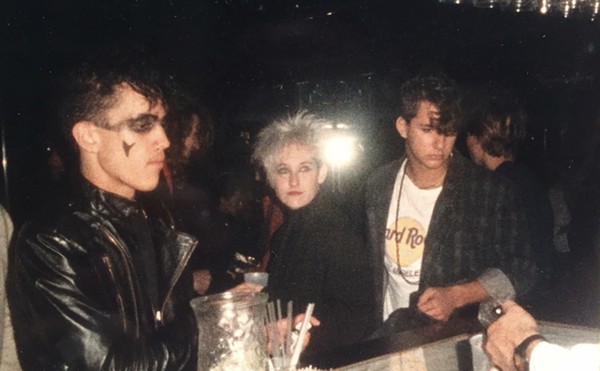“We’re a formidable gang without the crime” — From “Bulevar 2000”
As a gateway to both Latin America and the United States, Tijuana couldn’t be more symbolic: You go there to either get drunk, high, laid, or shot.
But if you know the right people and places, you can also enjoy the latest incarnation of one of Mexico’s most vibrant and edgy artistic meccas.
When a group of musicians, producers, DJs, and graphic artists formed Nortec Collective in 1999, they did the unthinkable: added a hip electronica/techno element to Mexico’s Northern tuba and clarinet-fueled banda and accordion- and bajo sexto-based norteña traditions. The result was The Tijuana Sessions Vol. 1 and The Tijuana Sessions Vol. 3 (from 2002 and 2005, respectively, the latter earning two Latin Grammy nominations), recorded by the whole collective of Fussible (Pepe Mogt), Bostich (Ramón Amezcua), Clorofila (Jorge Verdín), and Hiperboreal (Pedro Gabriel Beas). Past members Panóptica (Roberto Mendoza), Terrestre (Fernando Corona), and Plankton Man (Ignacio Chávez) participated in one or both of those first two albums.
Since then, the remaining four members continue touring incessantly and recording. Bostich + Fussible’s 2008 eponymous collaboration earned them a Grammy nomination as Best Latin Rock/Alternative album, and they released their sophomore Bulevar 2000 in September. Locally, they headline this year’s Latino Music Festival at Main Plaza.
Their recent gigs (an opening slot for UK’s Hot Chip in San Diego, Austin City Limits Festival, Rockefeller Plaza in New York and more) made it tough to get a hold of them, but Bostich finally gave in to my unrelenting pressure and gave his answers the only way he can: in Spanish, and electronically.
What I find most interesting in the way you deal with banda is that you give equal importance to the percussion, while frequently the tubas and clarinets seem to get all the attention. What’s your approach?
Banda’s percussion was a very important element in the creation of the Nortec sound, especially in “Polaris” `Bostich` and “Ventilador” `Fussible`. Many percussion fragments were processed with synthesizers and others with vocoder, and from that we got the song’s melodies and harmonies. Surprisingly, another important element was the poor execution by the musicians who recorded those percussions; most were out of rhythm. The imperfect percussion mixed with the square sound of electronica became the recipe for Nortec.
How do you structure your live shows? Who plays what?
We interact with the banda and norteño musicians (accordion, tuba, trumpet, and bajo sexto), and we have an electronic panel we call TSM (Tijuana Sound Machine) with new technologies like the Tenori-on, Monome, iPad and the classic TB-303. In this tour, the iPad has become the remote control of the mini-lab we mount in concert.
One of my greatest memories from Tijuana is eating mulitas at one of the stands on Bulevar Agua Caliente. But it is my understanding that to do so on Bulevar 2000 would not be such a hot idea … What’s going on there?
Bulevar 2000 was recently created with the idea of giving Tijuana an entrance and exit way, like a norteño Autobahn. But it ended up being a dangerous avenue associated with violence. In a few years, it will probably be full of businesses and housing complexes.
How has Tijuana changed since you got together? On the one hand, the violence has increased, but you also have a music scene that has evolved from rock bands to electronic musicians. The contrast always fascinated me.
Tijuana has changed in the last 10 years. Since 9/11, the border crossing has become very complicated for people on both sides, which bankrupted the city. Nowadays, we’re enjoying a rebirth on Calle Sexta (Sixth Street), which has become a bohemian place created by friends in order to gather lovers of electronic music.
So, just like dictatorships and other traumatic experiences in different countries gave birth to interesting art, the violence has had a similar effect in Tijuana?
Tijuana’s history is very young and has always been linked to problems related to migration, drug traffic, and violence. However, it is a city that has grown with a unique lifestyle that has inspired generations of multi-disciplinary artists.
OK, you know about the narcocorridos, norteño songs written to glorify the big drug lords. Imagine you and Fussible are enjoying some chelas at Calle Sexta, and a mean-looking guy jumps out of a black Ford Bronco and tells you, “My boss wants you to write an electrocorrido for him.” What do you do?
I don’t think we could ever do an electrocorrido. We’re very bad singers and there is no need to disappoint those guys. •
Nortec Collective Presents: Bostich + Fussible at the Third Annual
Latino Music Festival
Free
10:30pm Sat, Nov 6
Main Plaza
(210) 225-9800
mainplaza.org
















